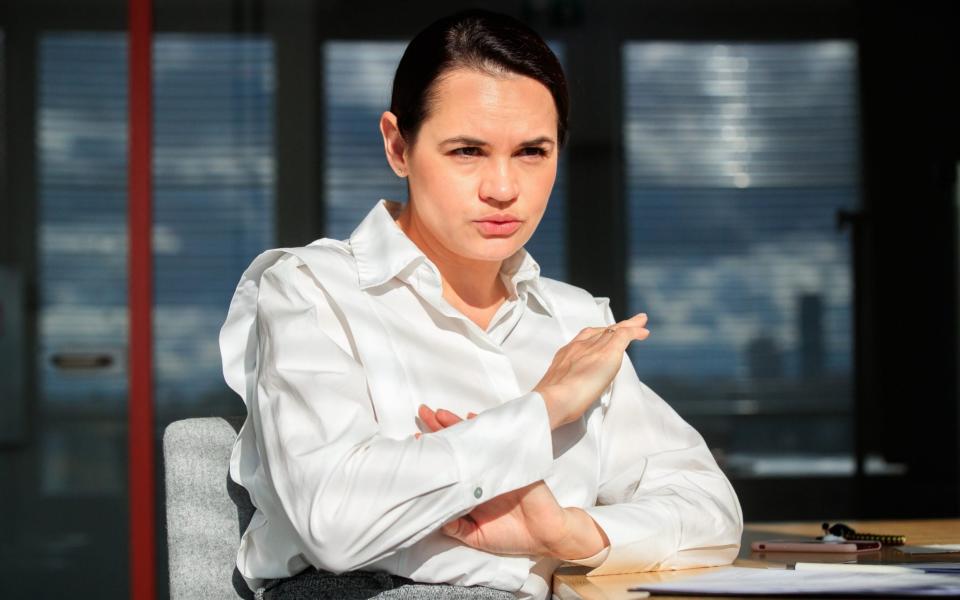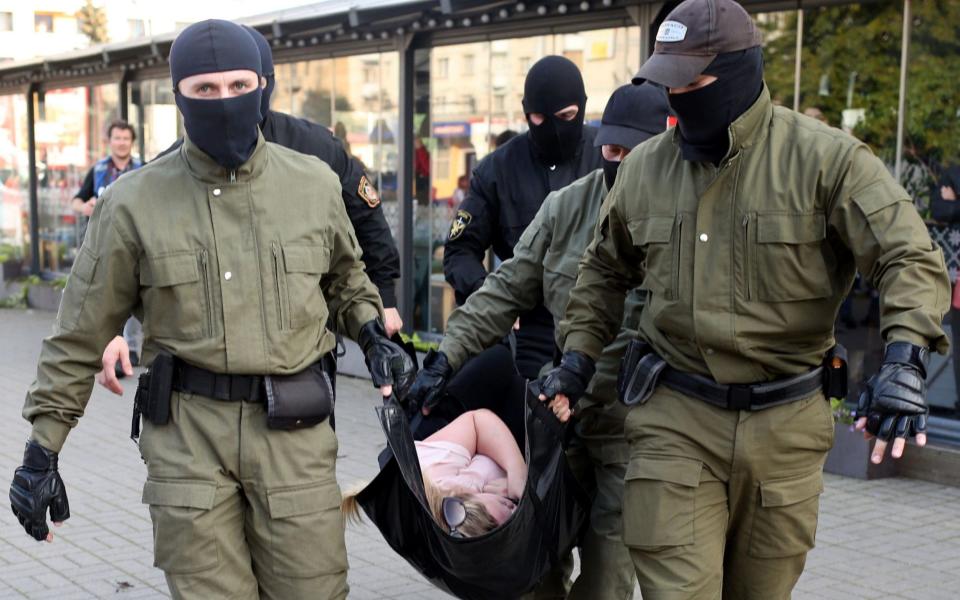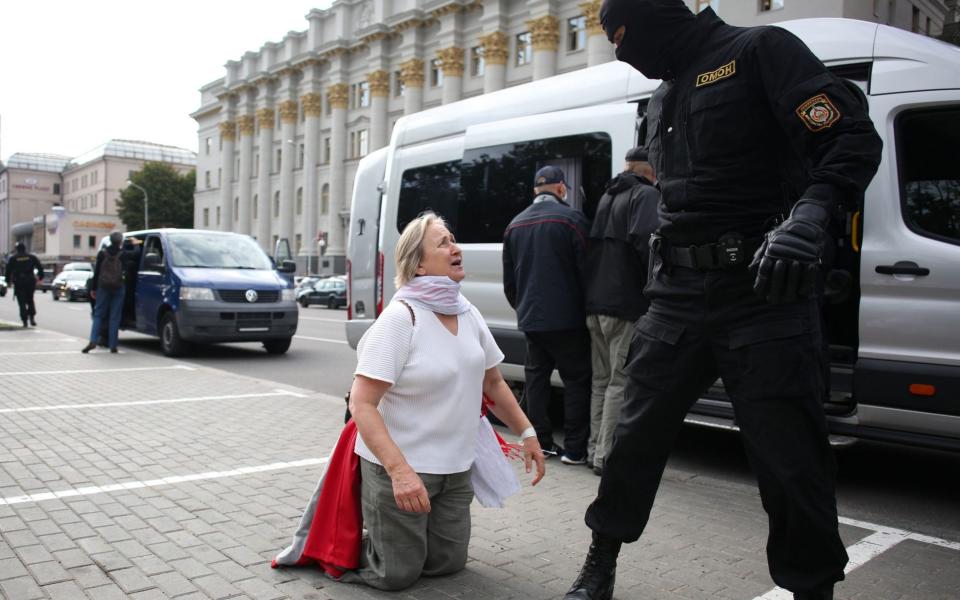Belarus opposition leader: I won't return to the kitchen ... I can't betray the hopes of a nation

Sviatlana Tsikhanouskaya sat by her phone last Saturday in a state of high anxiety. After four months without hearing from her husband, Sergey Tsikhanousky, a popular Belarusian Youtube blogger who was jailed after he tried to run for president, she was about to receive a call.
“I was all jittery. I picked up the phone, and he said: ‘Hi, did you recognise me?’’ the 38-year old Mrs Tsikhanouskaya, a former teacher who this summer emerged as the indisputable leader of the opposition, told the Daily Telegraph in the Lithuanian capital Vilnius.
“You talk and you feel scared that something you’ll say can hurt him because there are other people listening in.”
Her husband was allowed the phone call after Alexander Lukashenko, who was re-elected as president in a widely disputed Aug 9 vote, visited the notorious KGB prison to sit down for talks with him and other jailed opposition leaders.
Hailed by the Kremlin as the start of a much needed dialogue between the government and the opposition, the meeting would not have been possible if hundreds of thousands of Belarusians, inspired by Mrs Tsikhanouskaya’s presidential campaign, were not rallying in protest every Sunday, pressuring Mr Lukashenko to step down.
The mother of a ten-year old son and a five-year old daughter was a reluctant candidate: She filed her papers after her husband was disqualified from running. A few weeks later, Mr Tsikhanousky was jailed, and everything changed.
In a rare sit-down interview in a coronavirus-grippled Lithuania, Mrs Tsikhanouskaya recalled how she tried to quit her campaign out of fear several times but was pulled back from the brink by Belarusians’ hunger for change after more than two decades of political stagnation.
“I’m suffocated by fear and tiredness,” the petite woman with a sleek ponytail of black hair said. “But then I see all those people helping me... I can’t betray their hopes.”
In the back of a spacious office with panoramic windows, Mrs Tsikhanouskaya has a small white-red-white flag, one of the protest symbols, pinned to a desk divider and a crimson yoga mat on top of the drawers.

From there, she runs a team of several dozen Belarusians who all left the country in recent weeks to rally behind her while countless opposition figures remain in prison.
Two months earlier, the former English teacher walked into the election officials’ headquarters in the Belarusian capital Minsk the day after the election to lodge an official complaint against blatant vote-rigging that helped Mr Lukashenko secure an 80 percent win at the polls.
She was detained by security services and whisked out of the country in a clandestine operation that she is still hesitant to speak to speak about.
Mrs Tsikhanouskaya was given time to go home and pack but when she opened her closet she froze.
“I just physically couldn’t pack. I had the clothes that I wore and I grabbed that trouser suit, that was it,” she recalled, fiddling a keychain in the colours of Belarusian and Lithuanian flags.

She joined her children in Lithuania where they had been for over a month and went off the radar, fearful that her supporters would think that she betrayed them by fleeing.
Her running mate, Maria Kolesnikova, who would be jailed a month later when she tore up her passport to prevent a forceful expulsion, then gave a news conference in Minsk and addressed Mrs Tsikhanouskaya: “Sveta, if you hear me: I support you. You’re a hero. You did so much for Belarus.”
A few days later, Mrs Tsikhanouskaya reached out to some of her allies, and they started to arrive in Vilnius to build a genuine opposition headquarters.
Maria Moroz, her campaign adviser who became a close friend, told the Telegraph that the stay-at-home mum would “physically shake from fear” when she first had to speak publicly at campaign rallies in July.
Last week, Mrs Tsikhanouskaya went on a European tour, meeting with German Chancellor Angela Merkel and other European leaders who have refused to recognise Mr Lukashenko as the legitimate president, to speak out on the behalf of all of the opposition movement.

She still was anxious that she might “forget to say something important” or “fail to get your emotions across” to the European leaders, who may be well-informed about the atrocities committed by the Lukashenko regime but probably cannot personally understand the violence on the streets of Belarusian cities.
The protests which have engulfed virtually all segments of Belarusian society show no signs of abating: women march with flowers every Saturday, old age pensioners have chosen Monday as their day of rage, and cities and towns come out every Sunday for the main march.
Still, Belarusian riot police try to keep them at bay with beatings, tear gas and stun grenades.
Mrs Tsikhanouskaya is alarmed that the scenes of police atrocities that shocked the world in August have “become almost routine - that’s the scariest thing.”

The European Union earlier this month finally agreed to hit several dozen top Belarusian officials with sanctions. The UK went further, blacklisting Mr Lukashenko himself and pledging more sanctions.
Mrs Tsikhanouskaya is grateful for the support but she wants Europe to go an extra mile, slapping a wider range of Belarusian officials with visa bans and asset freezes: “Each of us Belarusians have become so brave, overstepping our fears. You live in safe countries. If you’re against violence, say it out loud.
Several European nations including Lithuania adopted broader national sanctions.
“It’s morally wrong that you go around beating people and the next day you go to Vilnius for shopping,” Linas Linkevicius, Lithuania’s foreign minister, told the Daily Telegraph, criticising the EU sanctions as being “too late” and “limited in scope.”
Mrs Tsikhanouskaya still has not heard from Russia, which threw its weight behind Mr Lukashenko at a critical moment, offering him an emergency $1.5 billion loan, but she hopes that Russian President Vladimir Putin will sooner or later side with her and her supporters:
“He definitely understands what’s going on in Belarus, that Belarus can’t live under Lukashenko.”
In Saturday’s phone call Mrs Tsikhanouskaya’s jailed husband, who was clearly barred from discussing politics with her, asked her to be “tougher.”
A few days later the mother of two issued an ultimatum for Mr Lukashenko after his meeting with the opposition produced no results:
“It’s been two months of the political crisis, violence and lawlessness - and we’ve had enough.”
Mr Lukashenko should release all political prisoners, stop the violence and step down, Mrs Tsikhanouskaya insists.
“We needed to give a firm deadline… so that law enforcement officers and officials have a very good think if they want to stay in this swamp of violence,” she said.

Unless the protesters’ demands are met, the entire country will go on strike on Oct. 26, shutting down production at factories and blocking roads.
Mrs Tsikhanouskaya was a rare opposition candidate who was allowed to run while prominent male opposition figures like banker Viktor Babaryka or Valery Tsepkalo were jailed or disqualified.
Mr Lukashenko dismissed her as a “housewife” who should go back home to make chops for her family.
After putting her career on hold to take care of her children ten years ago, Mrs Tsikhanouskaya had found another job as a teacher this spring and had been looking forward to start in September: “I was so excited I’d have a job to go to.”
In an interview with the Telegraph two months ago, she said she would be content to return to life as a stay-at-home mum if her husband was released. Now however Mrs Tsikhanouskaya feels that she needs to make good use of her battle experience.
“I’m not going back to the kitchen in any case,” she said.
“I’ve learnt so much that it’d be such a waste to bury all my knowledge and skills. I’m sure there’ll be a place for me in a new Belarus.”

 Yahoo News
Yahoo News 